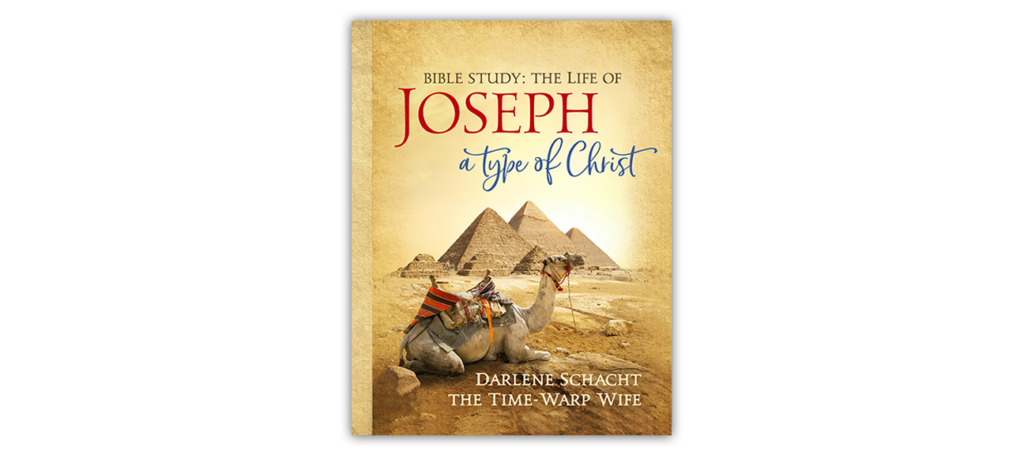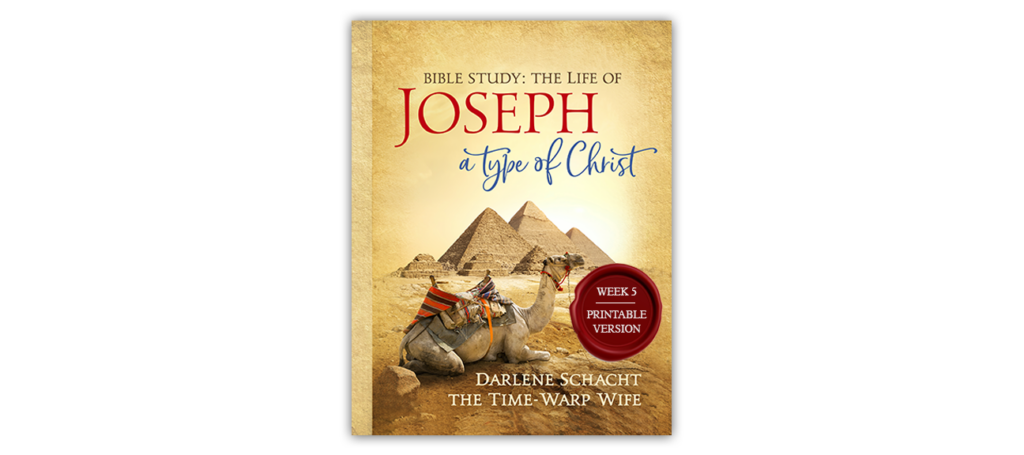
Looking for the other posts in this series? Click here for the table of contents.
This post contains affiliate links.
Note to email subscribers: If you have any trouble with the images or links on this page. Click through to the blog at TimeWarpWife.com
The study is free as each lesson is provided to you week-by-week! It’s also a great study for couples to do together.
Option 1:
If you would prefer to pick up a copy of the study guide instead of printing the lessons out, The Life of Joseph: A Type of Christ is available now at Amazon.com. When you purchase a copy of the study guide you’re helping to support this ministry as we share the gospel with over 500,000 women around the world.
Option 2:
Scroll down the page to find a FREE PDF version of this week’s lesson. Look for the image with the red seal on it. Come back each Monday as I’ll be providing them week-by-week.
* With either option, make sure you come back on Fridays for my concluding thoughts on each lesson and some free printable Bible verses.
Subscribe so you don’t miss a post:
Note the reading assignments at the beginning of each lesson. Make sure to read the Bible chapter before you read my thoughts.
If you would like to share your thoughts on the study, you can do so in the comment section below.

Genesis 38 – It’s Not Us – It’s All Grace
If you’ve studied the Bible at all, you’ve seen how God has used broken people to build his kingdom. He calls the sinful, the corrupt and immoral, drawing them to repentance, before using them for His glory and honor. Noah was a drunk, Abraham was a liar, Moses was a murderer, Rahab was a prostitute, and finally, we come to Judah in this chapter—a sinful man—and yet one through which the promise of the Messiah would come.
Some people read this chapter and completely miss the point. It’s not a story about birth control, and if that’s all you got from it, you need dig deeper. It’s a story about disobedience and a disregard for God. You see, Onan had a responsibility to marry Er’s widow and carry on his brother’s name. This custom was known as a Levirite Marriage. The Leverite law served to protect widows from danger and poverty, but was also an important part of the Hebrew culture because of the promise God made to Abraham that the coming Messiah would be born through his seed. To deny a woman her children would also deny her the opportunity to be a part of the promise and hope of the coming Messiah.
Any children born to Tamar would inherit the blessing passed down from eldest to eldest. It’s not that Onan refused to marry her—because obviously he did—it’s that he selfishly withheld children from Tamar to keep the blessing for himself. And so, we’re told that God slew Onan.
Instead of stepping up to the plate, Judah sidesteps his responsibility. Sure, he said that he was going give his youngest son to Tamar, but as the years passed, we see that Judah had no intention of doing that. In fact, so many years had passed by that Judah didn’t even recognize Tamar any more.
Tamar knew what needed to be done, and took it upon herself to fulfill her duties as Er’s widow. Judah on the other hand was sinful, irresponsible, and naïve. He shunned his responsibilities as a father, left his prized possessions in the hands of a harlot, and was willing to burn Tamar for the very same sin he was guilty of.
Despite all this, God chose Judah’s lineage to bring forth the coming Messiah. He chose one of those little twins to be in the line of Christ. He could have left Judah where he was in a life of wickedness and sin, but by His grace He called him to righteousness and kept calling Him to be the great leader of his tribe.
There are days when I ask myself, “Am I good enough, Lord?” Am I really good enough to lead a Bible study, to raise children, to be a good wife? Like Judah, I’ve been sinful, reckless, and rash. I’ve made bad decisions, and I’ve chosen my own selfish desires over God’s will. Can I be used by God with all the shortcomings I’ve had? And the answer is, yes. Not because of who I am, but because of who I’m becoming in Christ.
It’s all grace, pure grace. Nothing but the grace of our Lord.

Levirate Marriage:
Levirate marriage is a type of marriage in which the brother of a deceased man is obliged to marry his brother’s widow. The term levirate is a derivative of the Latin word levir, meaning ‘husband’s brother’… Levirate marriage can, at its most positive, serve as protection for the widow and her children, ensuring that they have a male provider and protector.
Levirate marriage can be a positive in a society where women must rely on men to provide for them, especially in societies where women are under the authority of, dependent on, in servitude to or regarded as possessions of their husbands, and to ensure the survival of the clan.
The practice of levirate marriage is strongly associated with patriarchal societies. The practice was extremely important in ancient times (e.g., Ancient Near East), and remains so today in parts of the world. Having children enables the inheritance of land, which offers security and status. (Source: Wikipedia)
Pause and Reflect
When we compare Chapter 44 to Chapter 37 and Chapter 38, what changes do we see in Judah?
According to Luke 15:10, what happens in Heaven when a sinner repents?
Was there a specific time in your life when you were drawn to repentance? What events led you there?
According to Deuteronomy 25:5-6, what was the custom regarding widows like Tamar?
What parallels, if any, do you find when you compare the life of Judah to the parables found in Luke 15?
Did You Know…
According to Jewish custom, the firstborn of the family (in this case, Er) was entitled to a double share of his father’s estate. If Er had a child, that child would receive the inheritance. If he was childless however, the double portion went to Onan, the next one in line.
Did You know…
The Levirate law has nothing to do with the tribe of Levi and does not stem from Levitical law. The term is derived from the Latin word Levir meaning “husband’s brother.”

Prayer: Thank You For Grace
Dear Heavenly Father,
Thank You for your unfailing grace. Thanks for Your kindness and patience as I’m learning to grow.
When I was lost You sought me out like the Good Shepherd You are. You loved me enough not to leave me in darkness and sin. You cared enough to leave the other ninety-nine sheep to rescue just one.
I’m in awe of Your kindness and love. Amazed at the wonderful way that You bless. Humbled and grateful for the gift of salvation, and how You continue to give again and again.
Teach me to walk in Your grace, Lord. Give me the wisdom and power to wisely use the freedom I’ve been given, so that I don’t use or abuse it in ways that I shouldn’t.
Help me to extend grace to others as I lay down my life to follow Your will.
In the name of Jesus, I pray. Amen.

Genesis 45 – Forgiveness and Grace
This chapter goes beyond forgiveness to the heart of love. Not just any love—agape love. It’s the greatest virtue one can possess because it reflects the love of God that reached down to us while we were yet sinners. Jesus died for the undeserving. He gave up His life so that we could have life.
Even after He was whipped and crucified and nailed to the cross He cried out, “Father forgive them for they know not what they do.” (Luke 23:34)
1 Corinthians Chapter 13 tells us that love bears all things. Some translate that as patience, but what it really means is to be patient in bearing the offenses and injuries of others. (Strong’s G3114)
Joseph had a choice to make (perhaps one he had considered for many years): would he punish his brothers? Would he imprison them? Would he put them to death? Or would he extend a hand of forgiveness and grace?
We’ve all been hurt at one time or another, and like Joseph we’ve all been faced with a choice. Would we extend grace to the ones least deserving? Would we love as Christ loved? Or could it be that we’re still hanging on to some of that anger and hurt?
Standing alone in a room with his brothers, Joseph chose grace.
We have to understand two things when it comes to grace.
- It doesn’t mean that we should put ourselves in danger. Sometimes there’s a need for boundaries. Family members can take advantage of us, and friends can hurt us so badly that we’re wise to have distance.
- It doesn’t mean they deserve it. We don’t forgive others because they’ve somehow reached our standard of perfection, we forgive them because God forgave us. He doesn’t hold back His kindness until we’ve repented, He reaches out with loving kindness that draws us to repent.
What about those who haven’t asked for forgiveness? In that case, do we still have to forgive? The answer is a resounding yes! Jesus addressed this kind of behavior and our response to it, in Luke Chapter 6:
But to you who are listening I say: Love your enemies, do good to those who hate you, bless those who curse you, pray for those who mistreat you. If someone slaps you on one cheek, turn to them the other also. If someone takes your coat, do not withhold your shirt from them. Give to everyone who asks you, and if anyone takes what belongs to you, do not demand it back. Do to others as you would have them do to you. (Luke 6:27-31, NIV)
Joseph didn’t perceive things the way that most of us do. He witnessed God’s hand at work in his life. He saw obstacles, as painful as each of them were, as God leading the way. He believed in the sovereignty of God—the power He had to give, and the power He had to take. The Bible tells us that, “The Lord has made everything for its purpose, even the wicked for the day of trouble.” (Proverbs 16:4, ESV) There’s nothing that surprises Him, there’s nothing beyond the realm of His power. While we make our plans, He determines our steps.
5 Things We Should Know About Grace
- It’s a gift. Grace isn’t something we earn, it’s a free gift from God.
- Grace is an expression of God’s love. God’s love always goes hand in hand with grace, and so should ours. He doesn’t love us because we’re perfect, He loves us in spite of our imperfections.
- Grace isn’t a ticket or an invitation to sin. Paul makes it very clear in Romans 6 that grace is not an invitation to sin. Grace leads us to repentance and newness of life.
- God’s grace excels ours. From time to time we see people extend grace and forgiveness. What’s unparalleled however is the level of grace that God poured out on Man when Jesus Christ gave His life in ransom for ours.
- We must extend grace. Just as we’ve been forgiven we must also forgive. We’ve been given grace, and we must also give grace. Grace does not pick and choose who deserves it, but freely gives at all times.

Pause and Reflect
What does Verse 8 teach us about Joseph’s view of God?
What does the parable of the unmerciful servant in Matthew 18:23-35 teach us about forgiving others?
What lessons can we learn about the way that Joseph handled his trials?
In what ways could our unforgiveness affect our relationship with God? See Mark 11:25 and Matthew 6:14-15
What took place within Jacob when he found out that Joseph was alive?
Prayer: Forgiveness and Grace
Dear Heavenly Father,
Help me to let go of anger, as I follow Your lead. Help me to reason and wisely discern situations, instead of acting on impulse, emotion, and pride.
Your word tells us, “He that is slow to anger is better than the mighty; and he that ruleth his spirit than he that taketh a city.” (Proverbs 16:32)
Give me the strength to do that Lord as I walk in forgiveness and grace.
Let Your Holy Spirit reign in my body. May it rule in my heart, and overflow in my life.
If I’m holding a grudge–if I have unresolved anger toward others–take it away from me, Lord. Fill my mind with peace and give me a heart of compassion.
Let grace abound, and teach me to love as You love.
In the name of Jesus, I pray. Amen.
This Week’s Challenge
Consider some of the people that you haven’t truly forgiven over the years. Maybe you’re still holding on to a bit of that anger. Ask God to help you understand this unforgiveness and to help you release it into His hands.
“We must renounce revenge and trust our cause to God and then return good for evil. That’s our part of forgiveness, and we can do it whether the adversary admits wrong or not. One great miracle has already happened in us. We’re not responsible for the other miracle of repentance in them.”
– John Piper
Bible Verse:
Love is patient, love is kind. It does not envy, it does not boast, it is not proud. It does not dishonor others, it is not self-seeking, it is not easily angered, it keeps no record of wrongs. (1 Corinthians 13:4-5)
The Life of Joseph: A Type of Christ 6-Week Bible Study Journal available now @Amazon.com
Available now at Amazon.com
When you purchase a copy of the study guide you’re helping to support this ministry as we share the gospel with over 500,000 women around the world.

The Life of Joseph: Printable Version – Week Five

Darlene Schacht and her husband Michael live in Manitoba Canada where the summers are beautiful and the winters are cold. Together they’ve come to learn that relationships aren’t always easy, but that marriage, the way God intended it to be, is a treasure worth fighting for.
She began her publishing journey about twelve years ago when she pioneered one of the first online magazines for Christian women, known at the time as “Christian Women Online Magazine.” After three years, Darlene left CWO to blog as a solo author at Time-Warp Wife Ministries.
It was also during this transition that she worked alongside actress Candace Cameron Bure to write the NYT Best-Selling book, Reshaping it All: Motivation for Spiritual and Physical Fitness. Reshaping it All was the winner of both the 2011 USA Best Book Awards and the 2012 Christian Reading Retailers Choice Awards.
Author of more than 15 books, Darlene continues to write and to minister to her readers through her blog at TimeWarpWife.com.
Connect with Darlene:
Facebook: @timewarpwife
Instagram: @timewarpwife
Pinterest: @timewarpwife
Twitter: @timewarpwife
You are loved by an almighty God,
Darlene Schacht
The Time-Warp Wife



